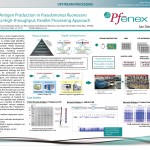
Pseudomonas fluorescens, a Gram-negative bacterium, has been specifically developed as a protein production platform to enable rapid identification of strains capable of expressing high titers of soluble and active protein. Pfēnex Expression Technology (TM) employs a toolbox of engineered P. fluorescens host strains, including protease deficient mutants and chaperone/ foldase overexpressors combined with a set of expression vectors encoding a variety of transcription and translation regulators, as well as a collection of periplasmic secretion signals. High-throughput automated transformation, growth, and expression analyses at the 96-well scale were employed to rapidly identify expression strategy and host strain combinations for production of high soluble yields of recombinant proteins including growth factors, antigens, and antibody derivatives. Employing a combinatorial approach to strain engineering, 100s or even 1000s of unique expression strains are constructed and evaluated in ~5 weeks. Expression plasmid/ host strain combinations identified at the 96-well scale are then selected for fermentation “range-finding” experiments to identify the most robust strains for production of larger quantities of material for further studies. We have applied these methods to successfully produce a number of difficult to express viral and microbial vaccine antigens, including those from P. falciparum , C. difficile, and several other bacterial pathogens.
